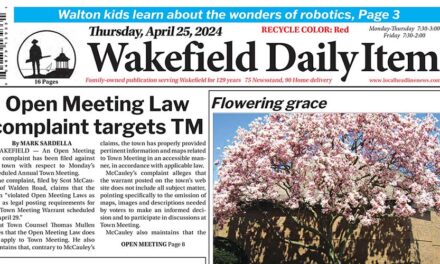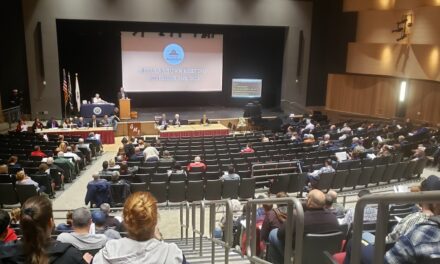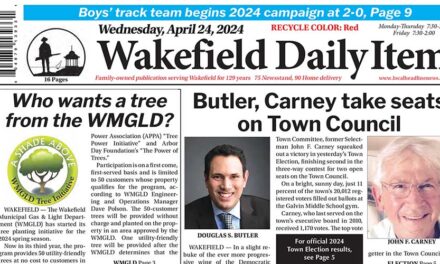Published in the September 28, 2016 edition
By: MARK SARDELLA
WAKEFIELD — Wakefield’s state legislative delegation paid a visit to the Board of Selectmen this week and Sen. Jason Lewis, Rep. Paul Brodeur and Rep. Donald Wong responded to a number of matters of concern to the board.
Selectman Ann Santos said that she was concerned about charter schools and wondered if there had been any push in the legislature to demand more accountability from the charters.
Brodeur said that the debate over charter schools has been going on since he got to the legislature, including the concerns from school committees in the district and across the state over the fact that charters are regulated by the state and are not subject to the same local oversight as traditional public schools.
Lewis talked about the way that charter schools are funded whereby the money follows the child, so that if a Wakefield student goes to a charter school, a sum equal to the average amount that it costs to educate a student in Wakefield goes with that student to the charter. He noted that the amount of state money that comes back to the home district is subject to a different formula and never really makes up the difference.
He maintained that when a child leaves a local district to attend a charter school, it doesn’t appreciably reduce the local system’s costs, meaning that the home district still has to bear the same costs with less funding. He called the current ballot question “an unfortunate way to fix the problems” around charter schools.
Wong pointed to another issue that could be addressed. He said that when a student enrolls in a charter school in September but decides halfway through the year to come back to his home district, the full funding for that student remains with the charter.
Town Administrator Stephen P. Maio noted that charter schools often don’t take students that need extra services but municipal school districts have to take all students and that higher average cost follows students attending charter schools. He added that towns like Wakefield just get charged for charter schools on the Cherry Sheet, without the charter school having to provide any sort of budget presentation.
Brodeur agreed that municipalities “at least should have a seat at the table” when it comes to funding and oversight of charter schools.
Moving on to economic development, Chairman of the Board of Selectmen Patrick Glynn asked the legislators what they were doing to help bring business and industry to Wakefield. He noted that with Edgewater Office Park and Lakeside Office park, Wakefield has the potential to house a lot of businesses.
Wong stressed the need to look at ways to showcase Wakefield’s potential. He also talked about the possibility of tax deductions and the willingness of local property owners to negotiate attractive deals as ways to attract business to the town.
Lewis said that he wished there was a “silver bullet” to bring business to towns in his district. He maintained that by increasing local aid, school funding and Chapter 90 transportation funding the legislature had prioritized local infrastructure, improving the overall business climate.
He also noted that the “MassWorks” program was just recapitalized and that Melrose and Malden have taken advantage of this funding. He pointed out, however, that a lot of the job of attracting business falls to the local communities in the form of things like tax incentives.
Brodeur said that the legislators could do a better job of working with towns like Wakefield to identify bond and grant funding and make successful pitches to secure those funds. He noted that with Wakefield’s land area and proximity to the highway it should be able to attract a variety of business tenants.
Glynn agreed, and challenged anyone to show him a community on Route 128 that was better positioned for growth than Wakefield with its AAA bond rating.
Glynn also asked about the status of three state grants slotted for Wakefield in this year’s budget: $100,000 for the Albion Cultural Exchange, $50,000 for improvements to the Public Safety Building and $25,000 for the opiate antidote, Narcan.
Lewis pointed out that these items had been vetoed by Gov. Baker and the Wakefield delegation had been instrumental in getting the legislature to override those vetoes and return the money to the budget.
Brodeur said that those funds were not necessarily in jeopardy. He said that the only way that the money could be in jeopardy would be if state revenue falls under certain benchmarks, which would trigger the governor’s ability to make emergency 9C cuts.
“We are not at risk yet,” Brodeur said, adding that he continued to be hopeful that the funds would remain in the budget.
Selectman Paul DiNocco stressed the need to address drainage and flooding in Wakefield and the region.
“If we get a large storm, your entire district will be flooded,” he told Wong. DiNocco said that he understood that money was an issue, but added that a solution was needed sooner rather than later.
Wong said that one possibility that could be explored would be having the Army Corps of Engineers come in and do some dredging to clean out some of the rivers and streams.
Lewis asked if a proper engineering study had been done of drainage in the town. DiNocco said that one was done just this past summer and the previous one was in 1990.
Lewis noted that flood mitigation is a difficult problem as it involves multiple towns and solutions have to be regional.
Selectman Phyllis Hull wanted to know what could be done to give senior citizens tax breaks in order to help them remain in their homes.
Lewis mentioned that the legislature had raised the income limits for the Circuit Breaker program, making more seniors eligible. He also noted that some towns allow seniors to defer taxes until their property is sold. He pointed out that Reading is currently considering shifting some property taxes from seniors to younger taxpayers and commercial properties.
Brodeur and Wong talked about ways to improve home care options as well as increase housing options for seniors who want to downsize.




